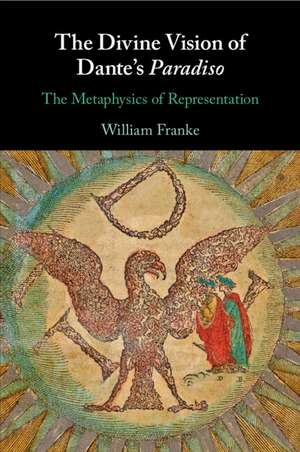The Divine Vision of Dante's Paradiso: The Metaphysics of Representation
Autor William Frankeen Limba Engleză Paperback – 26 iul 2023
| Toate formatele și edițiile | Preț | Express |
|---|---|---|
| Paperback (1) | 177.86 lei 6-8 săpt. | |
| Cambridge University Press – 26 iul 2023 | 177.86 lei 6-8 săpt. | |
| Hardback (1) | 573.76 lei 6-8 săpt. | |
| Cambridge University Press – 18 aug 2021 | 573.76 lei 6-8 săpt. |
Preț: 177.86 lei
Nou
Puncte Express: 267
Preț estimativ în valută:
34.05€ • 35.44$ • 28.03£
34.05€ • 35.44$ • 28.03£
Carte tipărită la comandă
Livrare economică 31 ianuarie-14 februarie 25
Preluare comenzi: 021 569.72.76
Specificații
ISBN-13: 9781009016919
ISBN-10: 1009016911
Pagini: 324
Dimensiuni: 230 x 152 x 21 mm
Greutate: 0.44 kg
Editura: Cambridge University Press
Colecția Cambridge University Press
Locul publicării:Cambridge, United Kingdom
ISBN-10: 1009016911
Pagini: 324
Dimensiuni: 230 x 152 x 21 mm
Greutate: 0.44 kg
Editura: Cambridge University Press
Colecția Cambridge University Press
Locul publicării:Cambridge, United Kingdom
Cuprins
Part I. The Literary Vision; 1. Writing as Theophany: The Medium as Metaphor for Immediacy; 2. The Presence of Speech in Writing: Speaking as Sparking; 3. The Parts of Speech: Mediation and Contingency; 4. From Speculative Grammar to Visual Spectacle and Beyond; 5. Sense Made Sensuous and Synaesthesia in the Sight and Sound of Writing; 6. Infinite Script: Endless Mediation as Metaphor for Divinity; Part II. Philosophical Reflections; I. Language as Concocted of Letters versus the Mysticism of the Name; II. Saussure and the Structuralist Idea of Language as a System of Differences; III. Temporalization and Transcendence of Time through Language; IV. Transcendental Reflection: Time Synthesis and the Role of the 'I'; V. Unmanifest Wholeness of Sense: Language as Image of the Imageless; VI. Transcendentality of Language and the Language of the Other.
Recenzii
'This is a brilliant and enjoyable book. With sharp interdisciplinary acumen, Franke provides lucid and creative readings that offer original and fruitful perspectives on Dante's Commedia, highlighting its relevance for contemporary studies in theology, philosophy and literature. The Divine Vision of Dante's Paradiso compellingly shows how Dante's bold and experimental writing can, even for us today, vivify in striking ways reflection on truth and its mediation.' Vittorio Montemaggi, King's College London
'This book possesses the outstanding qualities one has come to expect from Franke's scholarship: broad and deep mastery of the Western philosophical and theological traditions; attentive, nuanced, and fecund literary analysis; a crystal-clear, jargon-free, economical, elegant, and at times lyrical prose; a searching and intelligent devotion to groundbreaking inquiry. In Franke's view, Dante's longed-for vision of God is nothing other than his vision of Letters – of Writing that, in keeping with the doctrine of Incarnation, both is and is not God. Such Writing is not human but is revelation: it shows God visibly, yet at the same time it is not God's essence as the Absolute and the Infinite.' Gregory B. Stone, Louisiana State University
'Franke seeks to interpret Dante's vision of writing in ways that make it available to philosophical analysis and speculative contemplation, methods aesthetic and spiritual at the same time. Such connections offer important resources for philosophical and theological reflections that resonate 'in the excruciating dilemmas of [the] present cultural predicament' ... Highly recommended.' D. Pesta, Choice Connect
'This book possesses the outstanding qualities one has come to expect from Franke's scholarship: broad and deep mastery of the Western philosophical and theological traditions; attentive, nuanced, and fecund literary analysis; a crystal-clear, jargon-free, economical, elegant, and at times lyrical prose; a searching and intelligent devotion to groundbreaking inquiry. In Franke's view, Dante's longed-for vision of God is nothing other than his vision of Letters – of Writing that, in keeping with the doctrine of Incarnation, both is and is not God. Such Writing is not human but is revelation: it shows God visibly, yet at the same time it is not God's essence as the Absolute and the Infinite.' Gregory B. Stone, Louisiana State University
'Franke seeks to interpret Dante's vision of writing in ways that make it available to philosophical analysis and speculative contemplation, methods aesthetic and spiritual at the same time. Such connections offer important resources for philosophical and theological reflections that resonate 'in the excruciating dilemmas of [the] present cultural predicament' ... Highly recommended.' D. Pesta, Choice Connect
Notă biografică
Descriere
A bold study that reveals Dante's medieval vision of Scripture as theophany through pioneering use of contemporary theory and phenomenology.
